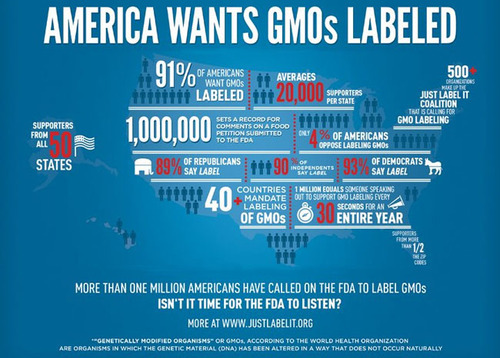In the war over GMO labeling, Big Food loses the PR battle
Food industry efforts to quash labeling initiatives further hurt genetically modified foods’ image…
Despite two decades of assurances from biotechnology firms, food processors, federal regulators and even a substantial share of scientists that GMO foods are safe, ballot initiatives and citizen petitions seeking labels on GMO foods are springing up as quickly as the industry can pay — or sue — to defeat them. Meanwhile, sales of foods labeled GMO-free have been steadily gaining ground on consumer shopping lists, and polls suggest that more Americans than ever favor labels that identify GMO foods.

This has even some supporters of genetic engineering wondering if it’s time to rethink the labeling question. “If you give people a choice and value, that wins,” said David Ropeik, a risk-communication consultant. He has begun calling on the industry to let go of its “fear of fear” and embrace GMO labeling, which is required in at least 64 other nations, including Japan, Australia, Russia, Brazil and more than a dozen European countries.
But Grant, like many industry stakeholders, remains skeptical. “To allow popular perception of harm — or benefit — to be the basis for mandatory labeling would not result in food being safer,” he argued. “It would result in the scientific community being pushed to the sidelines in favor of food-fad-of-the-day mob regulation.”
Whether or not that’s true, food makers are spending lavishly to avoid mandatory GMO labels. In 2012, for example, opponents of a California labeling proposition — including Monsanto, ConAgra and other genetically modified seed makers alongside food companies like Sara Lee, Coca-Cola and Kellogg’s — spent a staggering $46 million, primarily on lobbying and advertising, to defeat the measure. Similar efforts in Washington the following year prompted the state’s attorney general to sue the Grocery Manufacturers of America (GMA), alleging that the leading food industry lobby was hiding the identity of the contributors to its anti-labeling campaign in violation of state election laws. The GMA eventually came clean, revealing that dozens of contributors — including Nestle, Del Monte, Coca-Cola and Hershey — had chipped in $7 million to kill the measure.
In almost all such battles, the companies easily outspend label supporters.
Monsanto and Dupont Pioneer, for example, were among a long list of food industry interests that contributed over $15 million to defeat a labeling measure in Colorado during November’s elections, according to state records. Supporters of the bill managed to raise a tiny fraction of that amount. The initiative failed. Dupont, Monsanto, Kraft Foods, PepsiCo and other food industry players pumped more than $30 million into efforts to quash a similar ballot initiative in Oregon — twice the amount supporters were able to muster.
The industry is now locked in a fierce legal battle with Vermont, which passed a GMO labeling law last year, and companies have lobbied hard for federal legislation that would bar other states from following suit. A bill that would do that was introduced last spring by Rep. Mike Pompeo, a Republican from Kansas who, as it happens, received the largest single contribution — $10,000 — from the GMA for the 2014 election cycle, according to federal data. The bill did not make it out of committee, but Heather Denker, a spokeswoman for Pompeo’s office, said he plans to reintroduce the bill in coming weeks.
The industry justifies all these expenditures on a variety of grounds. For starters, companies say, a hodgepodge of differing state labeling laws would be unworkable, and even a federal labeling rule would make food more expensive. They also argue that genetic modification, which involves the insertion of foreign genes into an organism — so far mostly crops like corn and soy — so that it expresses a new and ostensibly desirable trait, is really just one among a variety of plant breeding techniques that have been used for decades without complaint.
More substantively, GMO supporters argue that there is no evidence to suggest genetically modified foods present any more risk than conventionally bred fare, a view generally held by a long list of scientific organizations, including the American Medical Association, the American Association for the Advancement of Science and the World Health Organization.
Taking a similar position, the U.S. Food and Drug Administration, which regulates food from GMO crops in conjunction with the U.S. Department of Agriculture and the Environmental Protection Agency, has seen fit to leave GMO labeling a strictly voluntary affair.
“As a public health agency, we base our policy decisions on the best science available,” said Theresa Eisenman, an FDA spokeswoman, in an emailed statement. “The agency is not aware of any information showing that foods derived from genetically engineered plants, as a class, differ from other foods in any meaningful or uniform way or that, as a class, such foods present different or greater safety concerns than their non-GE [genetically engineered] counterparts.”
Although the FDA’s review process is voluntary, virtually all producers of new GE products submit them to the agency for approval. Since the mid-1990s, the FDA has signed off on over 150 varieties of genetically engineered crops, though not all proved commercially viable. Most GMO-derived ingredients found on shelves today are from crops that were tweaked to improve resistance to pests and certain herbicides, but newer products with consumer-facing traits are in the pipeline. This includes the Arctic apple, which has been engineered to resist browning.
On Feb. 13 the USDA determined the apple was safe to grow, and the FDA is currently reviewing it.
Eisenman also said that the agency is reviewing two citizen petitions urging the FDA to create a mandatory GMO label but that no decisions has been made — much to the chagrin of many consumers who remain unconvinced that GMOs are safe.
